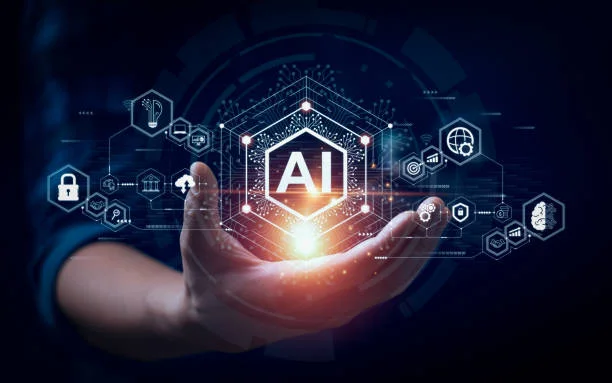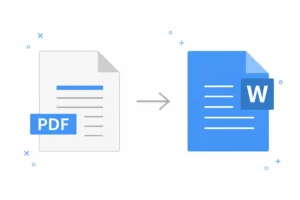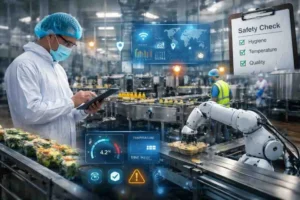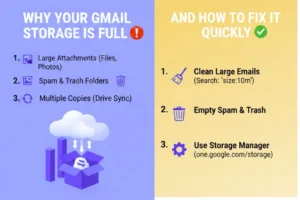Artificial Intelligence (AI) automation is revolutionizing industries, reshaping how businesses operate, and altering the job market. From customer service chatbots to self-driving cars, AI automation is rapidly integrating into our daily lives. A 2023 report by PwC predicts that AI could contribute up to $15.7 trillion to the global economy by 2030, making it a game-changer for businesses and individuals. But what exactly is AI automation, and how does it work? This article will analyse the fundamentals, applications, and potential impact of AI automation in an engaging yet informative manner.

What is AI Automation?
AI automation refers to the use of artificial intelligence to perform tasks without continuous human intervention. It combines AI’s decision-making capabilities with robotic process automation (RPA) to execute complex workflows. Unlike traditional automation, which follows pre-set rules, AI automation adapts, learns, and improves over time.

Key Components of AI Automation
What Are The Key Components of AI
By combining these technologies, AI automation can perform both simple and complex tasks across various industries.
Comparison: AI Automation vs. Traditional Automation
Feature | AI Automation | Traditional Automation |
Learning Capability | Adapts and improves over time | Follows fixed rules |
Decision Making | Can make complex decisions | Limited to pre-defined logic |
Flexibility | Can handle varied tasks | Best for repetitive tasks |
Scalability | Scales dynamically | Requires manual adjustments |
Cost Efficiency | Reduces long-term costs | Higher maintenance costs |
AI automation is more dynamic and intelligent compared to traditional automation, making it ideal for industries that require decision-making capabilities.

Applications of AI Automation
AI automation is influencing almost every industry, making processes more efficient and cost-effective.
1. Customer Service
Chatbots and virtual assistants like ChatGPT, Siri, and Alexa handle millions of customer queries daily. AI-powered chatbots are expected to handle 85% of customer interactions by 2025, reducing costs and improving response times.
2. Project Management
AI streamlines project management by predicting risks, optimizing resource allocation, and automating workflows. Tools like Monday.com and ClickUp integrate AI for more intelligent decision-making and efficiency.
3. Healthcare
AI automation assists in diagnostics, robotic surgeries, and personalized treatment plans. For instance, IBM’s Watson can analyze millions of medical records within seconds, assisting doctors in making more accurate diagnoses.
4. Manufacturing & Supply Chain
AI-powered robots are optimizing production lines and logistics. Amazon’s AI-driven supply chain reduces delivery times, and Tesla’s Gigafactories use automation to manufacture electric vehicles with minimal human intervention.
5. Teaching
AI-powered education platforms like Duolingo and Coursera use personalized learning algorithms to adapt to student needs. Virtual tutors, automated grading, and AI-driven feedback enhance learning efficiency.
6. Finance & Banking
Fraud detection systems use AI automation to analyze transactions and flag suspicious activities. According to McKinsey, AI could save the banking industry $1 trillion annually through fraud prevention and automation.
7. Marketing & E-commerce
AI-powered recommendation engines, like those used by Amazon and Netflix, analyze user behavior to suggest relevant products and content, increasing customer engagement and sales.
8. Human Resource Management
AI is transforming Human Resource Management by automating recruitment, performance management, and employee engagement. Tools like HireVue and Pymetrics analyze candidate profiles using AI-driven assessments, reducing hiring bias and improving recruitment efficiency.
9. AI-Powered Visuals & Image Generation
AI-driven tools like Midjourney, Deep Dream, and Lensa AI have revolutionized digital creativity, making it easier than ever to generate AI-generated images of yourself. These tools leverage deep learning algorithms to analyze facial features and apply artistic, hyper-realistic, or stylized transformations, turning ordinary photos into unique works of art
AI Growth Statistics
Artificial intelligence growth statistics reveal the global AI market size could exceed $2,500bn by 2032, at a compound annual growth rate (CAGR) of +19% during this period.
AI Automation Compound Annual Growth Rate (CARG)

Pros and Cons of AI Automation
Pros
- Increased Efficiency: AI-powered systems work 24/7 without fatigue, significantly improving productivity.
- Cost Reduction: Automating routine tasks reduces labor costs and operational expenses.
- Error Minimization: AI minimizes human errors, ensuring accuracy in data processing and decision-making.
- Scalability: Businesses can scale operations efficiently without a proportional increase in resources.
- Personalization: AI automation allows businesses to offer customized experiences to customers, improving satisfaction and retention rates.
Cons
- Job Displacement: Automation threatens several jobs, particularly in industries like manufacturing and customer support. A report by the World Economic Forum estimates that 85 million jobs could be displaced by AI automation by 2025. However, it could also create 97 million new roles, particularly in AI development and maintenance.
- Data Privacy Concerns: AI systems process vast amounts of personal data, raising concerns about security and misuse. Companies must implement strict data protection measures to maintain customer trust.
- Bias in AI Systems: AI algorithms can inherit biases from training data, leading to unfair decision-making. Ethical AI development practices are essential to mitigate this issue.
- Dependence on AI: Over-reliance on AI systems could lead to reduced human oversight, increasing risks in critical sectors like healthcare and finance.
Artificial intelligence is not a substitute for human intelligence; it is a tool to amplify human creativity and ingenuity
Fei-Lei-Li

Future of AI Automation
The future of AI automation is promising, with continuous advancements expected in the coming years:
- Autonomous Vehicles: AI-driven self-driving cars, like those developed by Tesla and Waymo, are expected to become mainstream, reducing traffic accidents and congestion.
- AI in Creativity: AI-powered tools assist in content creation, music composition, and even generating digital artwork.
- Advanced Robotics: AI-powered robots are becoming more sophisticated, and capable of handling delicate tasks in industries like healthcare and aerospace.
- AI-powered Smart Cities: Cities are integrating AI to optimize traffic flow, energy consumption, and waste management, enhancing urban living.
According to Gartner, by 2027, AI will be integrated into 90% of new enterprise applications, highlighting its growing significance.

Conclusion
AI automation is transforming industries, making processes more efficient and cost-effective. While it presents challenges, such as job displacement and ethical concerns, the benefits far outweigh the drawbacks. With continued advancements, AI automation will become an indispensable part of our lives, shaping the future of work and society.

As businesses and individuals, understanding and adapting to AI automation will be crucial in staying ahead in the digital era. Whether you’re an entrepreneur, a student, or a professional, now is the time to embrace AI automation and leverage its potential for growth and innovation.











